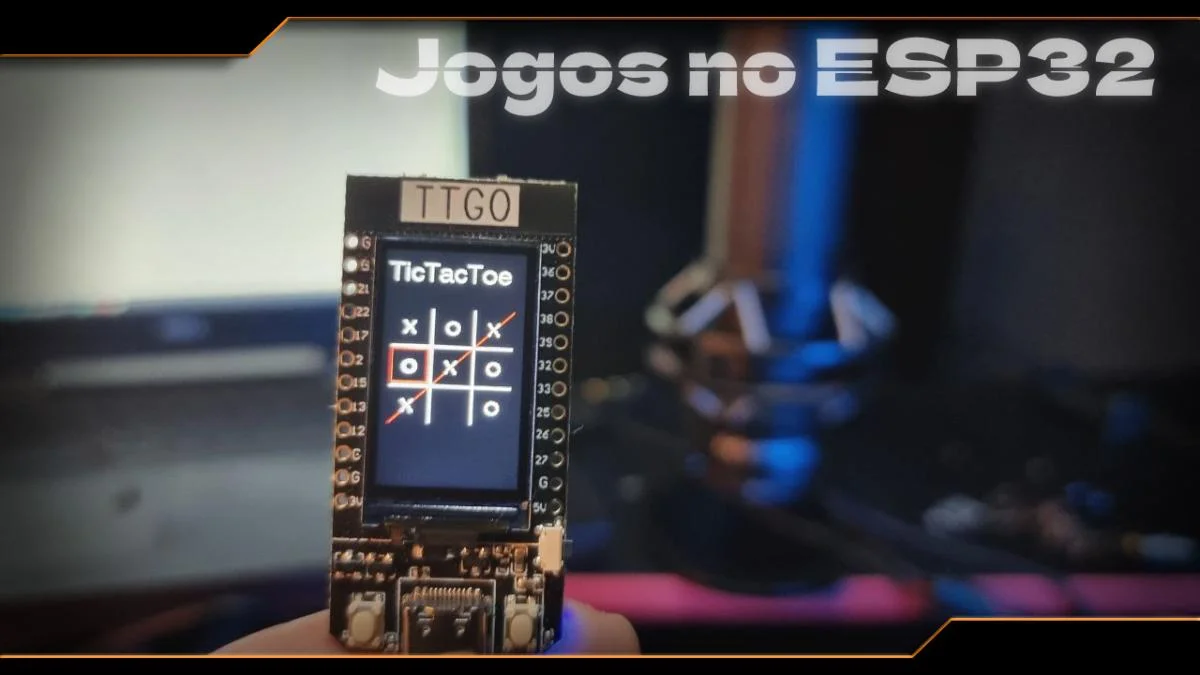Manual
do
Maker
.
com
Jogos no ESP32 #05: TicTacToe

TicTacToe (ou "tic tac toe", ou "tic-tac-toe") deve ser o jogo mais infantil que existe, mas não há quem não tenha jogado na infância!
Em português, o "jogo da velha" , ou "jogo do galo", ou "três em linha" é um jogo de regras claras e, jogando com atenção, não há como perder; ou ganhar. No papel é bastante fácil jogar, mas programar no ESP32 começa a dar um pouco de trabalho. Bem, alguém se deu ao trabalho de criar uma matriz funcional, com deslocamento e marcação de casa. Daí bastou pegar esse código inicial e criar uma pseudo-inteligência para jogar contra o ESP32. Mas houve "poréns".
Código base
Se quiser fazer sua própria implementação, o código base que usei foi esse:
#include <TFT_eSPI.h>
#include <SPI.h>
TFT_eSPI tft = TFT_eSPI();
int fromTop=60;
int fromLeft=10;
int space=5;
int boxSize=35 ;
int playGround=3*boxSize+2*space;
int i=0;
int j=0;
bool player=0;
int dd[3][3]={0};
char sign[2]={'x','o'};
void taskRandomNumber(void *pvParameters){
Serial.println(esp_random());
vTaskDelay(pdMS_TO_TICKS(1000));
}
void setup(void) {
Serial.begin(115200);
tft.init();
tft.fillScreen(TFT_BLACK);
tft.setTextColor(TFT_WHITE);
tft.drawString("TicTacToe",5,12,4);
pinMode(0,INPUT_PULLUP);
pinMode(35,INPUT_PULLUP);
tft.drawFastVLine(fromLeft+boxSize+space/2,fromTop,playGround,TFT_WHITE);
tft.drawFastVLine(1+fromLeft+boxSize+space/2,fromTop,playGround,TFT_WHITE);
tft.drawFastVLine(fromLeft+boxSize*2+space+space/2,fromTop,playGround,TFT_WHITE);
tft.drawFastVLine(1+fromLeft+boxSize*2+space+space/2,fromTop,playGround,TFT_WHITE);
tft.drawFastHLine(fromLeft,fromTop+boxSize+space/2,playGround,TFT_WHITE);
tft.drawFastHLine(fromLeft,1+fromTop+boxSize+space/2,playGround,TFT_WHITE);
tft.drawFastHLine(fromLeft,fromTop+boxSize*2+space+space/2,playGround,TFT_WHITE);
tft.drawFastHLine(fromLeft,1+fromTop+boxSize*2+space+space/2,playGround,TFT_WHITE);
tft.drawRect((fromLeft+(i*boxSize)+(i*space)),(fromTop+(j*boxSize)+(j*space)),boxSize,boxSize,TFT_RED);
//xTaskCreatePinnedToCore(taskRandomNumber,"taskRandomNumber",10000,NULL,0,NULL,0);
}
void loop() {
if(digitalRead(0)==0)
{
tft.drawRect((fromLeft+(i*boxSize)+(i*space)),(fromTop+(j*boxSize)+(j*space)),boxSize,boxSize,TFT_BLACK);
i=i+1;
if(i>2)
{
i=0;
j++;
}
if(j>2)
j=0;
tft.drawRect((fromLeft+(i*boxSize)+(i*space)),(fromTop+(j*boxSize)+(j*space)),boxSize,boxSize,TFT_RED);
delay(300);
}
if(digitalRead(35)==0)
{
tft.drawString(String(sign[player]),10+fromLeft+(i*boxSize)+(space*i),6+fromTop+(j*boxSize)+j*space,4);
if(player==0)
dd[i][j]=1;
if(player==1)
dd[i][j]=4;
player=!player;
checkWiner();
delay(300);
}
}
void checkWiner()
{
for(int m=0;m<3;m++)
{
int score=0;
int hscore=0;
for(int n=0;n<3;n++)
{
score=score+dd[m][n];
hscore=hscore+dd[n][m];
if(score==3 || score==12)
{
tft.drawFastVLine(fromLeft+(m*space)+(boxSize*m)+boxSize/2,fromTop,playGround,TFT_RED);
tft.drawFastVLine(fromLeft+1+(m*space)+(boxSize*m)+boxSize/2,fromTop,playGround,TFT_RED);
}
if(hscore==3 || hscore==12)
{
tft.drawFastHLine(fromLeft,fromTop+(m*space)+(boxSize*m)+boxSize/2,playGround,TFT_RED);
tft.drawFastHLine(fromLeft,fromTop+1+(m*space)+(boxSize*m)+boxSize/2,playGround,TFT_RED);
}
}
if(dd[0][0]+dd[1][1]+dd[2][2]==3 || dd[0][0]+dd[2][2]+dd[1][1]==12 ){
tft.drawLine(fromLeft,fromTop,fromLeft+playGround, fromTop+playGround,TFT_RED);
}
if(dd[0][2]+dd[1][1]+dd[2][0]==3 || dd[0][2]+dd[2][0]+dd[1][1]==12 )
{
tft.drawLine(fromLeft+playGround,fromTop,fromLeft, fromTop+playGround,TFT_RED);
}
}
}
Com esse código (e esse vídeo mostrando como configurar a biblioteca TFT_eSPI no TTGO T-Display) já é possível movimentar as posições com o botão esquerdo e marcar a casa com o botão direito. Porém, por ser apenas um esqueleto, encontramos alguns vícios (não considere como bugs em um esqueleto):
Sobreposição
Se escolhermos a posição inicial e em seguida repetirmos, ambos os caracteres que representam os jogadores serão marcados na mesma casa.
Matriz e deslocamento cruzados
O esqueleto não parece ter sido pensado para implementações futuras, já que as casas estão em colunas verticais, de cima para baixo, enquanto o deslocamento se dá na horizontal, da esquerda para a direita, de cima para baixo. Como o objetivo era aproveitamento de código, fiz alguns desvios nas boas práticas de código.
Implementações
Antes de fazer qualquer implementação, fiz uma análise estatística do TicTacToe e havia pensado em implementar algo elaborado, mas não é necessário, porque somos capazes de ganhar e de não perder, apenas olhando para a trama. Desse modo, procurei escrever um código que representasse minimamente o comportamento humano para fazer uma escolha. No vídeo mostro detalhes, inscreva-se para não perder essa série.
Nessa versão que implementei, nem o ESP32 nem o jogador sobrescrevem casas, sendo informados visualmente do erro.
O ESP32 avalia primeiramente a defesa, o que te dá uma margem para não perder, ainda que ele ganhasse invés de bloquear o oponente. Mas implementar a vitória como vantagem sobre a defesa também é possível. Que tal fazê-lo?
Se o ESP32 for perder, ele faz sua próxima jogada, se rendendo à sua vitória. Isso acontece quando há fechamento de duas fileiras, o que torna a derrota inevitável.
Código do TicTacToe contra o ESP32
Farei a versão humano vs humano usando WiFi, caso os quibadores não corram pra copiar o que está pronto, mas por enquanto divirta-se com a versão ESP32 vs humano. E não deixe de se inscrever para ver os vídeos relacionados a jogos no ESP32!!! Mas atenção: Essa versão contém bugs; melhore o jogo e repasse o código também!
O código atual:
#include <Arduino.h>
#include <SPI.h>
#include <TFT_eSPI.h>
TFT_eSPI tft = TFT_eSPI();
int fromTop = 60;
int fromLeft = 10;
int space = 5;
int boxSize = 35;
int playGround = 3 * boxSize + 2 * space;
int i = 0;
int j = 0;
int me = random(1, 10);
bool player = 0;
bool choiced = false;
bool myTime = false;
bool defensed = false;
int dd[3][3] = {0};
char sign[2] = {'x', 'o'};
uint8_t player_X = 1;
uint8_t player_O = 4;
int matrix_values[9] = {0};
long timeout = millis();
int last_pos = 0;
enum places {A,D,G,B,E,H,C,F,I};
enum shifter {sA,sB,sC,sD,sE,sF,sG,sH,sI};
bool virtual_shift = false;
bool virtual_enter = false;
void checkWiner();
void ESPlay();
void ESPlay() {
uint8_t k = 0;
for (uint8_t ii=0;ii<3;ii++){
for (uint8_t jj=0;jj<3;jj++){
matrix_values[k] = dd[ii][jj];
k++;
}
}
//DEFESA
//defesa linha 1
if ((matrix_values[A] + matrix_values[B] + matrix_values[C]) == 2){
if (matrix_values[A] == 0 && last_pos != sA ||matrix_values[B] == 0 && last_pos != sB || matrix_values[C] == 0 && last_pos != sC){
virtual_shift = true;
}
else{
virtual_enter = true;
defensed = true;
}
}
//defesa linha 2
else if ((matrix_values[D] + matrix_values[E] + matrix_values[F]) == 2){
if (matrix_values[D] == 0 && last_pos != sD ||matrix_values[E] == 0 && last_pos != sE || matrix_values[F] == 0 && last_pos != sF){
virtual_shift = true;
}
else{
virtual_enter = true;
defensed = true;
}
}
//defesa linha 3
else if ((matrix_values[G] + matrix_values[H] + matrix_values[I]) == 2){
if (matrix_values[G] == 0 && last_pos != sG ||matrix_values[H] == 0 && last_pos != sH || matrix_values[I] == 0 && last_pos != sI){
virtual_shift = true;
}
else{
virtual_enter = true;
defensed = true;
}
}
//defesa coluna 1
else if ((matrix_values[A] + matrix_values[D] + matrix_values[G]) == 2){
if (matrix_values[A] == 0 && last_pos != sA ||matrix_values[D] == 0 && last_pos != sD || matrix_values[G] == 0 && last_pos != sG){
virtual_shift = true;
}
else{
virtual_enter = true;
defensed = true;
}
}
//defesa coluna 2
else if ((matrix_values[B] + matrix_values[E] + matrix_values[H]) == 2){
if (matrix_values[B] == 0 && last_pos != sB ||matrix_values[E] == 0 && last_pos != sE || matrix_values[H] == 0 && last_pos != sH){
virtual_shift = true;
}
else{
virtual_enter = true;
defensed = true;
}
}
//defesa coluna 3
else if ((matrix_values[C] + matrix_values[F] + matrix_values[I]) == 2){
if (matrix_values[C] == 0 && last_pos != sC ||matrix_values[F] == 0 && last_pos != sF || matrix_values[I] == 0 && last_pos != sI){
virtual_shift = true;
}
else{
virtual_enter = true;
defensed = true;
}
}
//defesa diagonal A-I
else if ((matrix_values[A] + matrix_values[E] + matrix_values[I]) == 2){
if (matrix_values[A] == 0 && last_pos != sA ||matrix_values[E] == 0 && last_pos != sE || matrix_values[I] == 0 && last_pos != sI){
virtual_shift = true;
}
else{
virtual_enter = true;
defensed = true;
}
}
//defesa diagonal C-G
else if ((matrix_values[C] + matrix_values[E] + matrix_values[G]) == 2){
if (matrix_values[C] == 0 && last_pos != sC ||matrix_values[E] == 0 && last_pos != sE || matrix_values[G] == 0 && last_pos != sG){
virtual_shift = true;
}
else{
virtual_enter = true;
defensed = true;
}
}
else {
if (myTime && !defensed){
if (!choiced){
int me = random(1, 10);
while (matrix_values[me] != 0){
//int picked = random(1, 10);
//me = picked > 8 ? 8 : picked;
me = random(1, 10);
}
choiced = true;
}
Serial.print("my choice: ");
Serial.println(me);
if (me != last_pos){
virtual_shift = true;
}
else{
virtual_enter = true;
myTime = false;
choiced = false;
}
}
else {
defensed = false;
myTime = false;
}
//agora definir o shift
}
}
void setup(void) {
Serial.begin(9600);
tft.init();
tft.fillScreen(TFT_BLACK);
tft.setTextColor(TFT_WHITE);
tft.drawString("TicTacToe", 5, 12, 4);
pinMode(0, INPUT_PULLUP);
pinMode(35, INPUT_PULLUP);
tft.drawFastVLine(fromLeft + boxSize + space / 2, fromTop, playGround,TFT_WHITE);
tft.drawFastVLine(1 + fromLeft + boxSize + space / 2, fromTop, playGround,TFT_WHITE);
tft.drawFastVLine(fromLeft + boxSize * 2 + space + space / 2, fromTop,playGround, TFT_WHITE);
tft.drawFastVLine(1 + fromLeft + boxSize * 2 + space + space / 2, fromTop,playGround, TFT_WHITE);
tft.drawFastHLine(fromLeft, fromTop + boxSize + space / 2, playGround,TFT_WHITE);
tft.drawFastHLine(fromLeft, 1 + fromTop + boxSize + space / 2, playGround,TFT_WHITE);
tft.drawFastHLine(fromLeft, fromTop + boxSize * 2 + space + space / 2,playGround, TFT_WHITE);
tft.drawFastHLine(fromLeft, 1 + fromTop + boxSize * 2 + space + space / 2,playGround, TFT_WHITE);
tft.drawRect((fromLeft + (i * boxSize) + (i * space)),(fromTop + (j * boxSize) + (j * space)), boxSize, boxSize,TFT_RED);
// Serial.println(random(1,9));
}
void loop() {
if (millis() - timeout > 1000) {
timeout = millis();
//Serial.println(random(1, 10));
}
if (digitalRead(0) == 0 || virtual_shift) { // shift
last_pos = last_pos > 7 ? 0 : last_pos+1;
Serial.println(last_pos);
tft.drawRect((fromLeft + (i * boxSize) + (i * space)),(fromTop + (j * boxSize) + (j * space)), boxSize, boxSize,TFT_BLACK);
i = i + 1;
if (i > 2) {
i = 0;
j++;
}
if (j > 2) j = 0;
tft.drawRect((fromLeft + (i * boxSize) + (i * space)),(fromTop + (j * boxSize) + (j * space)), boxSize, boxSize,TFT_RED);
virtual_shift = false;
delay(300);
}
if (digitalRead(35) == 0 || virtual_enter) { // select
if (dd[i][j] != 0) {
Serial.println("busy");
tft.setTextColor(TFT_RED);
char who = player > 0 ? sign[0] : sign[1];
tft.drawString(String(who),10 + fromLeft + (i * boxSize) + (space * i),6 + fromTop + (j * boxSize) + j * space, 4);
delay(500);
tft.setTextColor(TFT_WHITE);
tft.drawString(String(who),10 + fromLeft + (i * boxSize) + (space * i),6 + fromTop + (j * boxSize) + j * space, 4);
}
else {
tft.drawString(String(sign[player]),10 + fromLeft + (i * boxSize) + (space * i),6 + fromTop + (j * boxSize) + j * space, 4);
if (player == 0) dd[i][j] = 1;
if (player == 1) dd[i][j] = 4;
player = !player;
checkWiner();
}
if (!virtual_enter){
choiced = false;
myTime = true;
Serial.println("esp joga");
}
virtual_enter = false;
while (digitalRead(35) == 0);
}
ESPlay();
choiced = false;
}
void checkWiner() {
for (int m = 0; m < 3; m++) {
int score = 0;
int hscore = 0;
for (int n = 0; n < 3; n++) {
score = score + dd[m][n];
hscore = hscore + dd[n][m];
if (score == 3 || score == 12) {
tft.drawFastVLine(fromLeft + (m * space) + (boxSize * m) + boxSize / 2,
fromTop, playGround, TFT_RED);
tft.drawFastVLine(
fromLeft + 1 + (m * space) + (boxSize * m) + boxSize / 2, fromTop,
playGround, TFT_RED);
}
if (hscore == 3 || hscore == 12) {
tft.drawFastHLine(fromLeft,
fromTop + (m * space) + (boxSize * m) + boxSize / 2,
playGround, TFT_RED);
tft.drawFastHLine(
fromLeft, fromTop + 1 + (m * space) + (boxSize * m) + boxSize / 2,
playGround, TFT_RED);
}
}
if (dd[0][0] + dd[1][1] + dd[2][2] == 3 ||
dd[0][0] + dd[2][2] + dd[1][1] == 12) {
tft.drawLine(fromLeft, fromTop, fromLeft + playGround,
fromTop + playGround, TFT_RED);
}
if (dd[0][2] + dd[1][1] + dd[2][0] == 3 ||
dd[0][2] + dd[2][0] + dd[1][1] == 12) {
tft.drawLine(fromLeft + playGround, fromTop, fromLeft,
fromTop + playGround, TFT_RED);
}
}
}
O vídeo sai entre hoje e logo mais, em DobitaobyteBrasil, não perca (e se inscreva)!
Inscreva-se no nosso canal Manual do Maker no YouTube.
Também estamos no Instagram.

Djames Suhanko
Autor do blog "Do bit Ao Byte / Manual do Maker".
Viciado em embarcados desde 2006.
LinuxUser 158.760, desde 1997.